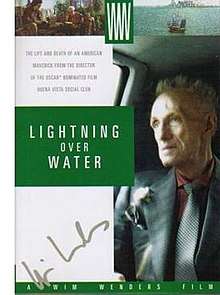Lightning Over Water
| Lightning Over Water | |
|---|---|
 | |
| Directed by |
Wim Wenders Nicholas Ray |
| Written by |
Nicholas Ray Wim Wenders |
Release date |
|
| Country |
West Germany Sweden |
| Language | German |
Lightning Over Water is a 1980 documentary film by Wim Wenders and Nicholas Ray about the last days of Ray's own life; the director was most famous for his 1955 film Rebel Without a Cause. It was screened out of competition at the 1980 Cannes Film Festival.[1]
Summary
The film is a collaboration between Wenders and Ray to document Ray's last days due to terminal cancer in 1979. The film is partially an homage to Ray who had a strong influence on Wenders' work, and partially an investigation on life and death. Ray's influence on Wenders includes Ray's "love on the run" subgenre as well as his film noir photography.
The film features excerpts from Ray's movies The Lusty Men and his unfinished final work We Can't Go Home Again. The sequence featuring the former excerpt was shot at Vassar College, at which Ray presented the movie and then gave a lecture, which itself is excerpted.
Nicholas Ray appears in a minor role in Wenders' film The American Friend. Wenders' science fiction film Until the End of the World is named for the last spoken words in Ray's 1961 Biblical epic film King of Kings.
The film crew is extensively featured onscreen. Jim Jarmusch, Ray's personal assistant at the time — and later a notable film director in his own right — can be briefly glimpsed at the 50:28 mark sitting at an editing console.
When Wenders goes to the Vassar campus to attend a lecture, a brief one-man performance is seen on-stage. It is Franz Kafka's story "A Report for an Academy", about an ape who becomes a man.
The American independent film director Jon Jost has recently come out against Wenders' status as the sole co-director, saying that Wenders "used his celebrity" to push Jost and Raúl Ruiz (director) out of the project that they had been the creators of.
References
- ↑ "Festival de Cannes: Lightning Over Water". festival-cannes.com. Retrieved 2009-05-30.